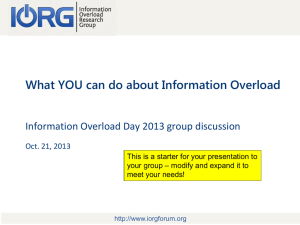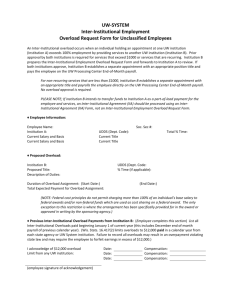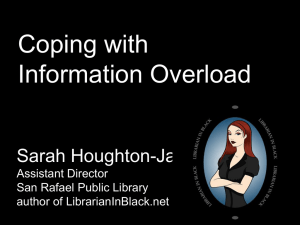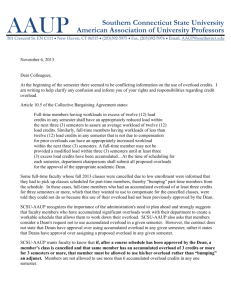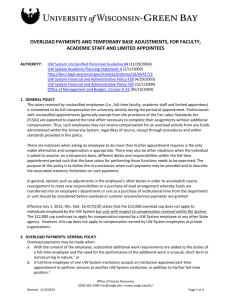Overload guidelines UWSP - updated
advertisement
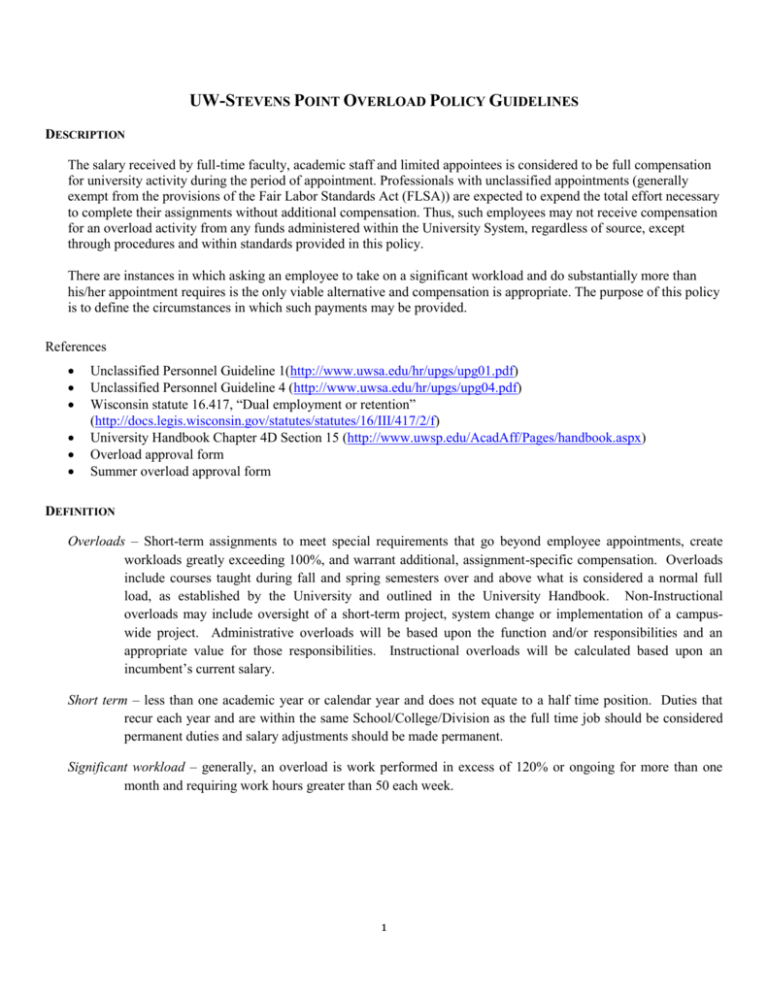
UW-STEVENS POINT OVERLOAD POLICY GUIDELINES DESCRIPTION The salary received by full-time faculty, academic staff and limited appointees is considered to be full compensation for university activity during the period of appointment. Professionals with unclassified appointments (generally exempt from the provisions of the Fair Labor Standards Act (FLSA)) are expected to expend the total effort necessary to complete their assignments without additional compensation. Thus, such employees may not receive compensation for an overload activity from any funds administered within the University System, regardless of source, except through procedures and within standards provided in this policy. There are instances in which asking an employee to take on a significant workload and do substantially more than his/her appointment requires is the only viable alternative and compensation is appropriate. The purpose of this policy is to define the circumstances in which such payments may be provided. References Unclassified Personnel Guideline 1(http://www.uwsa.edu/hr/upgs/upg01.pdf) Unclassified Personnel Guideline 4 (http://www.uwsa.edu/hr/upgs/upg04.pdf) Wisconsin statute 16.417, “Dual employment or retention” (http://docs.legis.wisconsin.gov/statutes/statutes/16/III/417/2/f) University Handbook Chapter 4D Section 15 (http://www.uwsp.edu/AcadAff/Pages/handbook.aspx) Overload approval form Summer overload approval form DEFINITION Overloads – Short-term assignments to meet special requirements that go beyond employee appointments, create workloads greatly exceeding 100%, and warrant additional, assignment-specific compensation. Overloads include courses taught during fall and spring semesters over and above what is considered a normal full load, as established by the University and outlined in the University Handbook. Non-Instructional overloads may include oversight of a short-term project, system change or implementation of a campuswide project. Administrative overloads will be based upon the function and/or responsibilities and an appropriate value for those responsibilities. Instructional overloads will be calculated based upon an incumbent’s current salary. Short term – less than one academic year or calendar year and does not equate to a half time position. Duties that recur each year and are within the same School/College/Division as the full time job should be considered permanent duties and salary adjustments should be made permanent. Significant workload – generally, an overload is work performed in excess of 120% or ongoing for more than one month and requiring work hours greater than 50 each week. 1 EXPECTATIONS THE GUIDELINES FOR OVERLOAD ASSIGNMENTS ARE BASED ON THE FOLLOWING EXPECTATIONS: Tenured and tenure-track faculty are expected to engage in teaching, scholarship and service Expectations related to teaching workload are defined by the University (see University Handbook, Chapter 4D Section 15) and must be applied consistently across the campus to ensure an efficient use of budget dollars. Additional teaching assignments during the academic year beyond defined teaching loads, including additional sections through Continuing Education and Winterim sections constitute overloads. High quality instruction is a significant expectation of all UW-Stevens Point courses. Using Faculty or Academic Staff, in excess of their normal workload, assumes that consistent, high-quality instruction will be demonstrated in all course offerings, including in the overload assignment. Limited positions on campus are ineligible for overloads. Administrative and Professional level positions (see UPG 1.03), where a short term project may be assigned to meet the needs of a particular unit or the campus, may be eligible for an Overload if the definition of “significant workload” is met and responsibilities cannot be shifted to other staff to accomplish the task without incurring an overload. The dean/unit director and the Provost’s office are responsible for ensuring compliance, equitable application of and appropriate funding for the overload appointments and payments. PROCESS AND TIMING Overload appointments must be approved in advance of the work being performed and payments should be made immediately following work performed or for projects that extend across several months on a regular basis during that interval (see Overload Approval Form). The Provost Office has final approval of Overload appointments. Copies of the Overload appointment and corresponding HRS paperwork should be submitted to the HR offices in advance of the appropriate payroll cycle. Deans, directors and department chairs are expected to monitor overload expenditures and appointments to ensure compliance with the policies and procedures (outlined in UPG 4 and FAP 29). Faculty and staff may reject overload assignments. Deans, directors and department chairs cannot require anyone to work an overload assignment. Violation of this policy may result in a denial of overload payment. PAYMENTS, CALCULATIONS, AND LIMITS Payment to employees for overload work performed will not be made if the requirements of the overload policy are not followed. Payments for faculty and instructional staff overloads for additional instruction should be based upon current salary; payments for administrative staff performing dissimilar duties from their own should receive a payment commensurate with the duties and responsibilities of the overload appointment. Beginning July 1, 2013, the overloads will be monitored on a fiscal-year basis and cover all payments made during that period, regardless of when the overload assignment was worked. Total overload payments may not exceed 20% of the base salary or $18,000, whichever is higher. This number does not include summer appointments (see below) and must account for work done during the academic year for employees paid on an academic-year basis. EXTRAMURAL FUNDING OF OVERLOADS On occasion, a faculty or academic staff member will secure extramural funding that includes salary for him/her which is payrolled through a UWSP account. In such an instance, it will be the individual’s responsibility to 2 indicate whether or not the extramural funding is expected to be recurring or non-recurring, unusual, and shortterm. This possibility needs to be clarified within the System policy. If the extramural funding source is federal, no additional compensation, either overload or temporary increase in base pay, may be made unless the terms of the extramural funding source contract/grant specifically allow such an additional payment. Overload payments administered through the university, regardless of the funding source, are subject to the requirements of this policy. SUMMER SERVICE AND SUMMER SESSION Summer Service and Session appointments are governed by the summer appointment guidelines (<insert link here>). NOTE: Employees paid during the summer cannot exceed 100% pay on any of the summer service/session payrolls/pay dates. UW System polices state that the compensation received in the summer period may not, in aggregate, exceed 2/9 of the academic year salary of the person appointed unless an explicit exception is granted by the Chancellor or designee, regardless of source of funds. At UWSP, this requires that faculty, academic staff, or limited appointee, on an academic year appointment must first obtain prior approval from the Dean/Director and the Provost for summer appointments resulting in compensation in excess of 2/9 of academic year. The following conditions apply for summer appointments in excess of 2/9: o Faculty and academic staff are eligible to receive up to 3/9 summer salary provided that at least 1/9 comes from extramural sources. In exceptional cases, to allow faculty and academic staff to meet ongoing institutional commitments, this policy allows all 3/9 of the summer appointment to be provided from non-extramural funds. o The combination of regular and overload appointments in any one summer may not exceed 3/9 of academic base salary o Faculty and staff of 3/9 summer appointment commit 100% of their time during the entire three month period. This precludes the possibility of summer vacation time. RECORDS Each School/College/Division is responsible for maintaining records of overload assignments and payments. Human Resources is responsible for maintaining finalized copies of approved HRS paperwork per the Records Retention Schedule. Audit An audit by Human Resources, UWSP Internal Audit, UWSA Internal Audit or the Legislative Audit Bureau may be conducted at any time; as such, units should keep documentation related to overload appointments and payments including the signed form, letter outlining duties and responsibilities of the employee and a copy of the HRS forms. Missing documentation will lead to the presumption, which can be overcome, that the overload policy has not been followed. AUGUST, 2013 3
